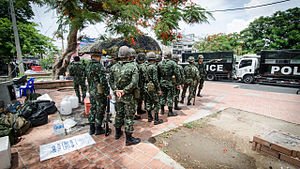Thailand’s political landscape has been marked by a series of coups since the establishment of its constitutional monarchy in 1932. This turbulent history set the stage for the events leading to the 2014 coup in Thailand. The period preceding the 22nd May 2014 coup was characterized by significant political unrest and frequent changes in government, creating an atmosphere ripe for military intervention.
The political instability can be traced back to the 2006 coup, which ousted then-Prime Minister Thaksin Shinawatra. This event triggered a prolonged period of political division, often manifesting in protests and clashes between opposing factions. The “Yellow Shirts,” generally aligned with royalist and conservative elements, and the “Red Shirts,” supporters of Thaksin and his populist policies, frequently took to the streets, leading to violent confrontations and a polarized society.
In the years leading up to the 2014 coup, the political climate continued to deteriorate. The Yingluck Shinawatra administration, which came to power in 2011, faced allegations of corruption and abuse of power. These accusations culminated in mass protests led by the opposition, demanding her resignation. The protests, which began in late 2013 and continued into 2014, significantly disrupted government operations and heightened tensions.
General Prayut Chan-o-cha, then Commander-in-Chief of the Royal Thai Army, emerged as a central figure during this period of unrest. As the situation escalated, the military declared martial law on May 20, 2014, under the pretext of restoring order. Two days later, on May 22, 2014, the military staged a coup, citing the need to end the political deadlock and restore stability. The constitution was immediately suspended, and military control was established, marking another significant coup in Thailand’s history.
The events of 22nd May 2014 unfolded swiftly, with key political figures detained and a curfew imposed nationwide. The military’s swift action and the subsequent establishment of the National Council for Peace and Order (NCPO) signaled the beginning of a new phase in Thailand’s political landscape, one dominated by military rule and significant restrictions on civil liberties.
External sources, including reports from the United Nations and various human rights organizations, have extensively documented the 2014 coup in Thailand, providing a comprehensive understanding of the political turmoil and the immediate aftermath of the military takeover. These accounts underscore the complexity of Thailand’s political history and the cyclical nature of its coups.
Impacts and Aftermath of the 2014 Thai Coup
The 2014 coup in Thailand, specifically on 22nd May 2014, had profound and far-reaching impacts on the country’s political, social, and economic landscape. One of the immediate consequences was the suspension of the constitution, which led to the establishment of military rule under the National Council for Peace and Order (NCPO). This action effectively dissolved the existing government and parliament, centralizing power within the military junta. The NCPO implemented a range of policies and reforms aimed at stabilizing the country, including economic stimulus measures and anti-corruption campaigns. However, these actions were often criticized for lacking transparency and inclusivity.
The coup significantly affected civil liberties and human rights in Thailand. Under military rule, there was a marked increase in censorship and restrictions on freedom of speech. The NCPO imposed strict regulations on the media, limiting criticism of the government and curtailing public demonstrations. Reports from organizations such as Human Rights Watch and Amnesty International highlighted numerous cases of arbitrary detention and suppression of political dissent. These measures raised serious concerns about the erosion of democratic principles and the rule of law in Thailand.
Internationally, the 2014 Thai coup drew varied reactions. Key global players and organizations, including the United States, the European Union, and the United Nations, expressed their disapproval and called for a swift return to civilian rule. Economic sanctions and reductions in aid were among the measures taken by some countries to pressure the military government. Despite this, the NCPO maintained control and sought to strengthen ties with regional powers like China and Russia. This shift in alliances underscored the complex geopolitical dynamics at play.
The broader implications of the coup for Thailand’s political stability were significant. The military’s role in governance became more pronounced, with the NCPO outlining a roadmap for political reform that included the drafting of a new constitution. Although elections were eventually held in 2019, many critics argued that the new constitution entrenched military influence in politics. The ongoing political situation in Thailand remains volatile, with periodic protests and calls for democratic reforms reflecting deep-seated divisions within society. Scholarly articles and news reports continue to analyze the long-term effects of the 2014 coup, emphasizing the necessity for genuine democratic processes and respect for human rights.

